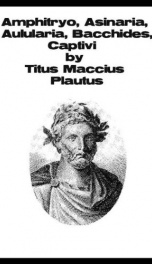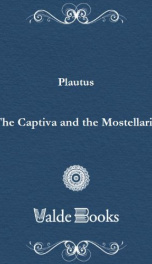Amphitryo, Asinaria, Aulularia, Bacchides, Captivi

From Content: "In this and each succeeding volume a summary will be given of the consensus of opinion1 regarding the Greek originals of the plays in the volume and regarding the time of presentation in Rome of Plautus's adaptations. It may be that some general readers will be glad to have even so condensed an account of these matters as will be offered them. The original of the Amphitruo is not now thought to have been a work of the Middle Comedy but of the New Comedy, very possibly Philemon's ??? -a???. A clue to the Greek play's date is found in the description of Amphitryon's battle with the Teloboians,2 a battle fought after the manner of those of the Diadochi who came into prominence at the death of Alexander the Great. The date of the Plautine adaptation of this play, as in the case of the Asinaria, Aulularia, Bacchides,3 and Captivi, is quite uncertain, beyond the fact that it no doubt belongs, like almost all of his extant work, to the viii last two decades of his life, 204-184 B.C. The Amphitruo is one of the five4 plays in the first two volumes whose scene is not laid in Athens. The ??a??? of a certain Demophilus,5 otherwise unknown to us, was the onginal of the Asinaria. The assertion of Libanus that he is his master's Salus6 is thought to be a fling at the honours decreed certain of the Diadochi, who were called, while still alive, S?t??e?. This possibility, together with the fact that the Pellaean7 merchant and the Rhodian8 Periphanes travel to Athens-northern Greece and the Aegaean therefore being pacified and Athens at peace with Macedon-would indicate that the ??a??? was written while Demetrius Poliorcetes controlled Macedon, 294-288 B.C. Very slender evidence connects the Aulularia with some unknown play of Menander's in which a miser is represented ded??? -? t? t?? ??d?? ? ?ap??? ?????t? fe???. Euclio's distress9 at seeing any smoke escape from his house seems at least to suggest that Plautus may have borrowed the Aulularia from Menander. The allusion to praefectum mulierum,10 rather than censorem, would seem to show that in the original ???a???? ?-?? had been written; this would prove the Greek play to have been presented while Demetrius of Phalerum was in power at Athens (317-307 B.C.), where he introduced this detested office, which was done away with by 307 B.C. ix Ritschl11 has shown clearly enough that the original of the Bacchides was Menander's ??? ??apat??. The fact that Athens, Samos, and Ephesus are at peace, that the Aegaean is not swept by hostile fleets, that one can travel freely between Athens and Phoeis, together with the allusion to Demetrius,12 lead one to believe that the ??? ??apat?? was written either between the years 316-307 or 298-296 B.C. The original of the Captivi is quite unknown, while the war between the Aetolians and Eleans gives the only clue to the date of this original. Hueffner13 considers it probable that the war was that between Aristodemus and Alexander, and the Greek play was produced shortly after 314 B.C. Others14 assume that the scene of the play would not be Aetolia unless Aetolia had become an important state, and that the war was therefore one of the third century B.C. "
Info about the book
Author:
Series:
Unknown
ASIN:
B007HY6HRM
Rating:
3/5 (3)Your rating:
0/5
Languge:
English
Users who have this book
Users who want this book
What readers are saying
What do you think? Write your own comment on this book!
write a commentif you like Amphitryo, Asinaria, Aulularia, Bacchides, Captivi try:
Other books by this author
Do you want to read a book that interests you? It’s EASY!
Create an account and send a request for reading to other users on the Webpage of the book!


